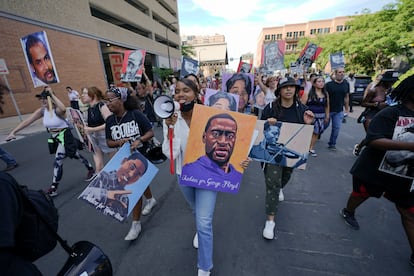Texas governor seeks to pardon Army sergeant convicted of protest murder
Daniel Perry was found guilty in the 2020 fatal shooting of an armed protester during nationwide protests against police violence and racial injustice

Texas Gov. Greg Abbott said Saturday that he is seeking to pardon a U.S. Army sergeant who was convicted of murder in the 2020 fatal shooting of an armed protester during nationwide protests against police violence and racial injustice.
Abbott tweeted that because the state constitution limits him to a pardon only on a recommendation by the state Board of Pardons and Paroles he is asking the board to recommend a pardon and to expedite his request in order to pardon Sgt. Daniel Perry.
“I look forward to approving the board’s pardon recommendation as soon as it hits my desk,” Abbott wrote.
Perry was convicted Friday by a Travis County jury of fatally shooting 28-year-old Garrett Foster during a protest in Austin. He faces up to life in prison when sentenced.
“Texas has one of the strongest ‘Stand Your Ground’ laws of self-defense that cannot be nullified by a jury or a progressive District Attorney,” Abbott said.
A phone call to District Attorney José Garza’s office on Saturday was not answered.
Perry’s attorneys argued that the shooting was self-defense as Foster approached Perry’s car with an AK-47 rifle. Prosecutors said Perry could have driven away before firing his revolver and witnesses testified that Foster never raised his rifle at Perry.
Perry, who was charged in 2021, was stationed at Ft. Hood about 70 miles (112 kilometers) north of Austin in July 2020 when he was working for a ride-sharing company and turned onto a street and into a large crowd of demonstrators in downtown Austin.
In video streamed live on Facebook, a car can be heard honking before several shots ring out and protesters begin screaming and scattering.
When Foster was killed, demonstrators in Austin and beyond had been marching in the streets for weeks following the police killing of George Floyd.
Floyd died May 25, 2020, after a Minneapolis police officer pressed his knee against the Black man’s neck for more than nine minutes. Floyd, who was handcuffed, repeatedly said he couldn’t breathe.
Floyd’s killing was recorded on video by a bystander and sparked worldwide protests as part of a broader reckoning over racial injustice.
Sign up for our weekly newsletter to get more English-language news coverage from EL PAÍS USA Edition
Tu suscripción se está usando en otro dispositivo
¿Quieres añadir otro usuario a tu suscripción?
Si continúas leyendo en este dispositivo, no se podrá leer en el otro.
FlechaTu suscripción se está usando en otro dispositivo y solo puedes acceder a EL PAÍS desde un dispositivo a la vez.
Si quieres compartir tu cuenta, cambia tu suscripción a la modalidad Premium, así podrás añadir otro usuario. Cada uno accederá con su propia cuenta de email, lo que os permitirá personalizar vuestra experiencia en EL PAÍS.
¿Tienes una suscripción de empresa? Accede aquí para contratar más cuentas.
En el caso de no saber quién está usando tu cuenta, te recomendamos cambiar tu contraseña aquí.
Si decides continuar compartiendo tu cuenta, este mensaje se mostrará en tu dispositivo y en el de la otra persona que está usando tu cuenta de forma indefinida, afectando a tu experiencia de lectura. Puedes consultar aquí los términos y condiciones de la suscripción digital.








































